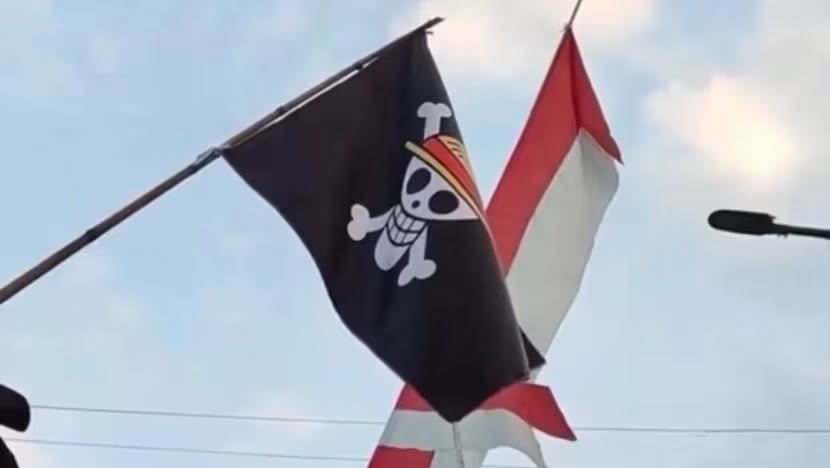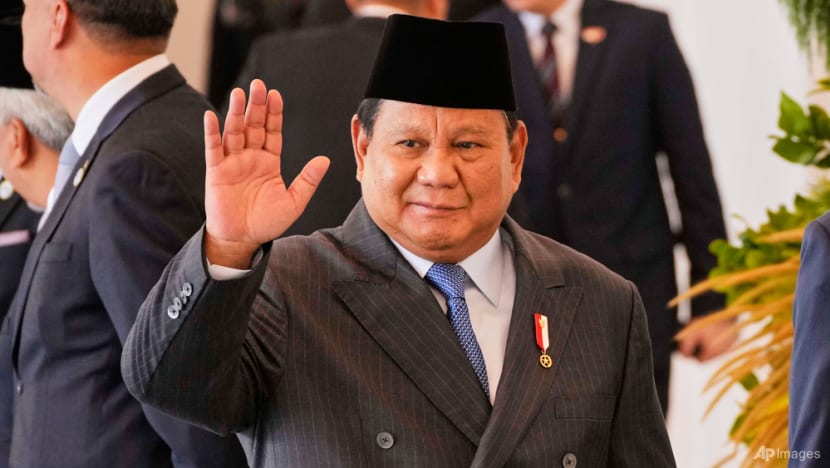Commentary: Prabowo’s Indonesia draws opposition via cartoon pirates
Pop culture resistance can become a powerful form of resistance – especially when authorities overreact, says a writer who covers Southeast Asia politics.

The Jolly Roger flag from Japanese anime series One Piece flies alongside the Indonesian flag ahead of the country's 80th year of independence. (Photo: Instagram/@cilegon)
CANBERRA: The lead up to Indonesia’s Independence Day on Aug 17 is a colourful affair. Red and white blankets every surface and pole in the country ahead of celebrations. This year will mark an 80-year milestone – one the government isn’t keen on sharing with a popular long-running anime TV series.
One Piece is a classic for a reason, a tale of good people versus a draconian regime that rules with an iron fist and ostentatious decadence. The story follows Monkey D Luffy and fellow Straw Hat Pirates in a quest for treasure that would allow the gang to overthrow the evils of World Government.
But in Indonesia, for anime fans of a particular political persuasion, the parallels with the increasingly centralised government led by President Prabowo Subianto are attractive.

THE CLASH OF BANNERS
And so, with Aug 17 looming, the flag under which Monkey and friends strive – a cartoon jolly roger wearing Monkey’s straw hat – has become a symbol of dissent in Prabowo’s Indonesia. It began slowly, with the cartoon flag appearing on the back of trucks and spreading widely online.
Now, with the ubiquity of the Indonesian flag across the country this month, the appearance of the jolly roger displayed underneath the red and white has erupted into a culture war.
“The Indonesian flag is not a choice. It is a necessity. The Indonesian flag cannot be replaced,” Hasan Nasbi, head of the president’s communications office, told local media on Monday.
Protesters say that’s not quite what is happening. The South China Morning Post published comments from one anonymous user who claimed “The red-and-white flag is too sacred for us to raise right now, at a time when many people are still colonised by those in power.” The flag is “the spirit of resistance against injustice”. It’s a sentiment widely echoed online.
POP CULTURE IN POLITICAL DISSENT
Fandom of the mega-popular anime is not a prerequisite. Savvy internet users have become accustomed to pop culture references replacing explicit naming and shaming. Euphemisms for the country’s government and leading political figures are a common feature of online dissent.
China has seen Winnie-the-Pooh equated with Xi Jinping, for example. And in Indonesia, too, through the Joko Widodo period, “Wakanda”, the fictional country in which Marvel’s 2018 hit Black Panther is based, became the name of choice for Indonesia in online discussions to critique moves that were strikingly similar to those made by the then president.
As with all regulation, what “counts” as violations and who gets to decide is slanted to favour those with power. It often reveals authorities to be deeply fearful of dissent.
During Jokowi’s consecutive terms, the controversial Information and Electronic Transactions Law was increasingly deployed against individuals the government accused of defamation and hate speech or displays of “immorality”. A pandemic-era discussion about revising those laws ultimately fizzled, but by then the fear had set in anyway.
Such deliberate online obfuscation has continued into the Prabowo era, suggesting it is simply now a feature of public discourse in Indonesia as long as dissent remains curtailed.
PRABOWO’S STRUGGLES
That pairs with another feature of the Prabowo era – the inability to ever let anything go. Prabowo’s desire to be seen as a great unifier has been very successful in the parliament, with all parties now kissing the ring. This leaves the people as the sole source of opposition, and, despite a sizable win over his presidential challengers, Prabowo has found bringing the country to heel is much more difficult.
Countrywide protests earlier this year clearly rattled the President. The protests, dubbed Indonesia Gelap (Dark Indonesia), focused on reforms to the military law, but soon spilled over to broader social issues including police violence and corruption. They were large, dramatic and, at times, violent. But they were also short-lived.
For Prabowo, the threat lingers. He accused foreign interlopers and corruptors of bankrolling the movement during a speech at the Solidarity Party of Indonesia’s conference last month. This was despite there being no large-scale demonstrations against his government for months.
Which brings us back to One Piece and the cartoon jolly roger in the vicinity of Indonesia’s national flag.
Deputy House Speaker Sufmi Dasco Ahmad, Prabowo’s right hand man and the closest we often get to what the president himself thinks, is scathing of the display. “There is a coordinated attempt to divide the nation,” he told media on Friday. Police have warned communities across the country of crackdowns and white paint is at the ready if anyone thinks that cartoon murals are a better move than flags.
Erin Cook is a journalist covering Southeast Asia politics. This commentary  on Lowy Institute's blog, The Interpreter.











